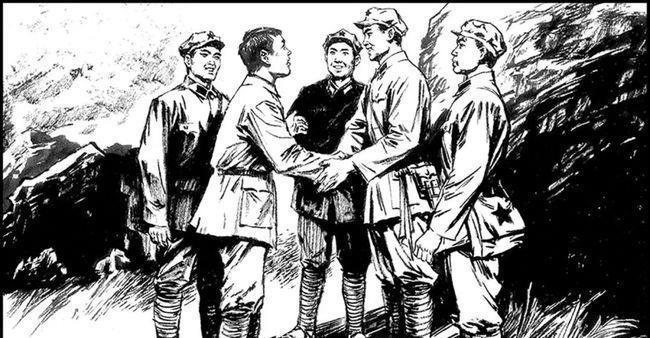He was then the acting platoon commander of a platoon of the machine gun company of the 13th Regiment of the 5th Division of the 2nd Army of the Nationalist Army.
In December 1929, he accompanied his troops to Ji'an to participate in the encirclement and suppression of the Red Army. On that occasion, he led a whole platoon of fighters to attack the Red Army base area on the lonely river in Ji'an, and took this opportunity to take 22 soldiers from his platoon, as well as 2 heavy machine guns and 8 rifles, and defected to the Red Army.

At that time, according to the relevant reward regulations of the Red Army, a heavy machine gun could get a reward of 250 pieces of the present ocean, and a rifle could get a reward of 50 pieces of the current ocean, so the Red Army decided to reward each of them with 50 pieces of ocean.
But in the face of a large number of white flowers and flowers, he said, "We came from the Kuomintang army to join the Red Army, in order to find a bright road, not to take money." "The Reward of the Red Army was refused.
After this matter was known to The chief of the Red 5 Army, Mr. Peng, was deeply moved, and Mr. Peng specially found a time to receive him and encouraged him to actively participate in the revolution.
He was the later founding major general: Ye Changgeng.
Ye Changgeng was born in 1903 in Kaihua, Zhejiang, and Tonglu and Lin'an in Zhejiang also said that he was a Tonglu and Lin'an. Due to the poverty of his family, he worked as a porter for the landlord's family when he was a teenager. In 1926, when he went to Guangdong as a porter, he joined the National Revolutionary Army in Guangdong, serving as a soldier in the machine gun company of the 13th Regiment of the 5th Division of the 2nd Army, and later participating in the two major battles of Nanchang and Nanjing in the Northern Expedition. Because of his resourcefulness and bravery in the war, he was promoted to acting platoon leader of a machine gun company.
After Chiang Kai-shek betrayed the revolution, Ye Changgeng was still full of identification and yearning for the ideas and beliefs of our party, and when the troops were stationed in Jingdezhen, he secretly sent weapons to Fang Zhimin's troops. Therefore, this time, he came to Ji'an with his troops to encircle and suppress the Red Army, and he saw the opportunity and led his troops to the red army camp of the other side.
After joining the Ranks of the Red Army, what happened to Ye Changgeng?
He successively served as the commander of the machine gun brigade of the special task force of the Red 5th Army, the commander of the 42nd Regiment of the Red 8th Army, the commander of the 12th Independent Division of Gannan Province, and the acting chief of staff of the Tingxianggan Military Region.
After the outbreak of the War of Resistance Against Japanese Aggression, he successively served as chief of staff and deputy commander of the 4th Military Region of the Jin-Cha-Ji Military Region, and as the head of the militia of the 5th Special Bureau of Jin-Cha-Ji, and participated in the Battle of Chen Zhuang and the Battle of the Hundred Regiments. Later, he led his troops into the northeast, served as the commander of the Heilongjiang Provincial Military Region, led his troops to participate in the struggle against bandits, eliminated more than 30,000 bandits, and suppressed a number of pseudo-Manchu traitors and Kuomintang agents. At the end of the Liberation War, Ye Changgeng, then deputy commander of the 50th Army, was ordered to march south and fight in the southwest, participating in major battles such as the Battle of Western Hubei and the liberation of Chongqing and Chengdu.
In 1955, Ye Changeng was awarded the rank of major general. He grew from a porter to a general, from the early southern conquest and the northern war, birth and death to various grievances in the later stage, but his faith in revolution never wavered. In his later years, he also compiled and published the book "From Porter to General" in the memoir of the revolution. On April 2, 1986, Ye Changgeng, a veteran general from Zhejiang, died at the age of 83.
More Exciting Articles:
Lü Zhengcao's "Xiaoqiao Adaptation" and his three cadres
During the War of Resistance, he actually let the soldiers all take the bench to fight and killed thousands of enemies, what about after the victory of the War of Resistance?